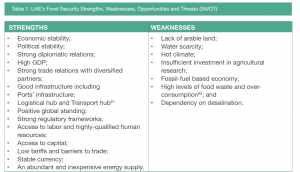The UAE has one of the world’s most comprehensive plans to address food security, but much can be done to improve its resilience and sustainability. The UAE is considered food secure due to its economic and political stability. As a desert country, lacking in water and arable land, the UAE is facing considerable food security challenges of its own. With a growing population, and rising consumption needs, the UAE must tackle this challenge head on. Indeed, the UAE has recently appointed a new Minister of State for Food Security, signaling a renewed focus on this strategic policy area.This paper aims to draw conclusions and recommendations on how to enhance the policy, regulatory and governmental frameworks to effectively address food security.


Despite the rapid economic and technological advances that the world has seen over the last two decades, there remains 793 million undernourished people in the world1.This constitutes a significant decline from previous decades where it stood at 1.01 billion in 1990-92. However, this number remains high and is likely to increase if food production and distribution channels are severely impacted by climate change or conflict. Food security is a major concern for many countries, either because they are unable to produce enough food to feed their populations or because regional or
global economic, political, or environmental crises have the ability to significantly impact their food supplies. The Middle East and North Africa (MENA) region in particular faces unique challenges resulting from the scarcity of freshwater resources,regional conflicts, and rising temperatures, among others. According to the UN Food and Agriculture Organization (FAO), the region’s shrinking freshwater resources are being negatively impacted by climate change and will have a heavy bearing on the region’s food availability and stability. While undernourishment has decreased worldwide, conflict has caused the number of undernourished people in the MENA region to increase. The region, which gets the majority of its food energy from cereals, cannot produce enough cereals to meet its needs and is currently the world’s largest net importer of cereals.While the United Arab Emirates (UAE), is considered food secure due largely to its economic and political stability, it still must address food security challenges
resulting from water scarcity, climate change, hot climate, and regional instability. Long-term food security and self-sufficiency are key strategic goals for the UAE government. For example, the Ruler of Dubai, H.H. Sheikh Mohammed Bin Rashid has recently appointed a new Minister of
State for Food Security, signaling a renewed focus on this strategic policy area.
Due to the limited supply of arable land, water, and a heavy reliance on imported food, food security has become a key policy priority for the UAE. Despite importing about 80-90% of its food supplies, the UAE is considered food secure due to its capacity to purchase food on the
international market even if at higher costs. However, food security remains a concern, particularly on a long-term basis, due to supply
challenges for production and importation. The importance of focusing on food security policies became clear in 2007 when rising global food
prices caused the UAE to struggle to secure basic commodities. In the UAE, food prices are on the rise and will only increase with the
implementation of the Value-added Tax (VAT) in 2018.
The UAE has made substantial investments towards its food security and it benefits from a number of key strengths that have made it food secure. Strong diplomatic and trade relations, easy access to trade markets, and well-functioning trade ports have enabled easy access to food supplies through food import strategies. However, the UAE also faces a number of challenges that threaten its food security that will likely persist in the future.
The UAE’s most glaring challenge, that differentiates it from many food-secure countries in the world, is its climate. As a desert, the UAE
has a very limited amount of arable land, suffers from extreme weather in the summer time, and sees very little rain fall. This climate poses a
huge challenge not just for domestic food production, but also for food storage. Water supply is extremely limited and a reliance on
desalination makes agricultural production difficult.
As a result of its inability to produce its own food, the UAE relies on imports. Its highly developed logistics infrastructure makes importing food effective and efficient.
However, the lack of sufficient economic diversification from heavy reliance on petroleum means that the UAE finances its food imports primarily through fossil fuel revenues, leaving the country vulnerable to fluctuations in trade between food and oil. Food imports are also expensive and lead to a need for food subsidies in order to keep food affordable. The higher food prices related to such supply complications do not directly threaten the
UAE as it is currently able to finance the risks, but any shocks to the UAE’s economy would immediately affect food availability and
affordability. Rising domestic food prices may pose a political risk if the population finds itself unwilling or unable to pay the prices. A
rising cost of living means that food may become unaffordable for portions of the population if subsidies were ever lifted.
These issues are aggravated by a rise in demand for food and by eating preferences that are highly diverse and globalized. Food consumption in
the UAE is growing due to the influx of tourists, and to overall population growth. Food consumption in the Gulf Cooperation Council
(GCC) as a whole is expected to expand at a compound annual growth rate (CAGR) of 4.2% “from an estimated 48.1 million MT (metric tons) in 2016
to 59.2 million MT in 2021”. Rising income has led to changing and increasingly globalized diets as well as to sedentary lifestyles that
have resulted in a rise in “lifestyle diseases” such as diabetes and obesity.
To address these challenges and threats, the UAE depends heavily on its strengths, namely its economic and political stability, stable currency
and high Gross Domestic Product (GDP). Strong diplomatic and trade relations have underpinned its food security strategies, and access to
capital and low tariffs and barriers to trade have facilitated this process effectively. Strong regulatory frameworks and access to human
capital positions the UAE to enhance its food security through strategic, sustainable, and forward-thinking policies that efficiently
and effectively utilize its comparative advantages.
